Cognitive Distortions: 22 Examples & Worksheets (& PDF)
 We tend to trust what goes on in our brains. After all, if you can’t trust your own brain, what can you trust?
We tend to trust what goes on in our brains. After all, if you can’t trust your own brain, what can you trust?
Generally, this is a good thing—our brain has been wired to alert us to danger, attract us to potential mates, and find solutions to the problems we encounter every day.
However, there are some occasions when you may want to second guess what your brain is telling you. It’s not that your brain is purposely lying to you, it’s just that it may have developed some faulty or non-helpful connections over time.
It can be surprisingly easy to create faulty connections in the brain. Our brains are predisposed to making connections between thoughts, ideas, actions, and consequences, whether they are truly connected or not.
This tendency to make connections where there is no true relationship is the basis of a common problem when it comes to interpreting research: the assumption that because two variables are correlated, one causes or leads to the other. The refrain “correlation does not equal causation!” is a familiar one to any student of psychology or the social sciences.
It is all too easy to view a coincidence or a complicated relationship and make false or overly simplistic assumptions in research—just as it is easy to connect two events or thoughts that occur around the same time when there are no real ties between them.
There are many terms for this kind of mistake in social science research, complete with academic jargon and overly complicated phrasing. In the context of our thoughts and beliefs, these mistakes are referred to as “cognitive distortions.”
Before you continue, we thought you might like to download our three Positive CBT Exercises for free. These science-based exercises will provide you with a detailed insight into Positive CBT and will give you additional tools to address cognitive distortions in your therapy or coaching.
This Article Contains:
What are Cognitive Distortions?
Cognitive distortions are biased perspectives we take on ourselves and the world around us. They are irrational thoughts and beliefs that we unknowingly reinforce over time.
These patterns and systems of thought are often subtle–it’s difficult to recognize them when they are a regular feature of your day-to-day thoughts. That is why they can be so damaging since it’s hard to change what you don’t recognize as something that needs to change!
Cognitive distortions come in many forms (which we’ll cover later in this piece), but they all have some things in common.
All cognitive distortions are:
- Tendencies or patterns of thinking or believing;
- That are false or inaccurate;
- And have the potential to cause psychological damage.
It can be scary to admit that you may fall prey to distorted thinking. You might be thinking, “There’s no way I am holding on to any blatantly false beliefs!” While most people don’t suffer in their daily lives from these kinds of cognitive distortions, it seems that no one can completely escape these distortions.
If you’re human, you have likely fallen for a few of the numerous cognitive distortions at one time or another. The difference between those who occasionally stumble into a cognitive distortion and those who struggle with them on a more long-term basis is the ability to identify and modify or correct these faulty patterns of thinking.
As with many skills and abilities in life, some are far better at this than others–but with practice, you can improve your ability to recognize and respond to these distortions.
These distortions have been shown to relate positively to symptoms of depression, meaning that where cognitive distortions abound, symptoms of depression are likely to occur as well (Burns, Shaw, & Croker, 1987).
In the words of the renowned psychiatrist and researcher David Burns:
“I suspect you will find that a great many of your negative feelings are in fact based on such thinking errors.”
Errors in thinking, or cognitive distortions, are particularly effective at provoking or exacerbating symptoms of depression. It is still a bit ambiguous as to whether these distortions cause depression or depression brings out these distortions (after all, correlation does not equal causation!) but it is clear that they frequently go hand-in-hand.
Much of the knowledge around cognitive distortions come from research by two experts: Aaron Beck and David Burns. Both are prominent in the fields of psychiatry and psychotherapy.
Experts in Cognitive Distortions: Aaron Beck and David Burns
If you dig any deeper into cognitive distortions and their role in depression, anxiety, and other mental health issues, you will find two names over and over again: Aaron Beck and David Burns.
These two psychologists literally wrote the book(s) on depression, cognitive distortions, and the treatment of these problems.
Aaron Beck

Aaron Beck began his career at Yale Medical School, where he graduated in 1946 (GoodTherapy, 2015). His required rotations in psychiatry during his residency ignited his passion for research on depression, suicide, and effective treatment.
In 1954, he joined the University of Pennsylvania’s Department of Psychiatry, where he still holds the position of Professor Emeritus of Psychiatry.
In addition to his prodigious catalog of publications, Beck founded the Beck Initiative to teach therapists how to conduct cognitive therapy with their patients–an endeavor that has helped cognitive therapy grow into the therapy juggernaut that it is today.
Beck also applied his knowledge as a member or consultant for the National Institute of Mental Health, an editor for several peer-reviewed journals, and lectures and visiting professorships at various academic institutions throughout the world (GoodTherapy, 2015).
While there are clearly many honors, awards, and achievements Beck may be known for, perhaps his greatest contribution to the field of psychology is his role in the development of cognitive therapy.
Beck developed the basis for Cognitive Behavioral Therapy, or CBT, when he noticed that many of his patients struggling with depression were operating on false assumptions and distorted thinking (GoodTherapy, 2015). He connected these distorted thinking patterns with his patients’ symptoms and hypothesized that changing their thinking could change their symptoms.
This is the foundation of CBT – the idea that our thought patterns and deeply held beliefs about ourselves and the world around us drive our experiences. This can lead to mental health disorders when they are distorted but can be modified or changed to eliminate troublesome symptoms.
In line with his general research focus, Beck also developed two important scales that are among some of the most used scales in psychology: the Beck Depression Inventory and the Beck Hopelessness Scale. These scales are used to evaluate symptoms of depression and risk of suicide and are still applied decades after their original development (GoodTherapy, 2015).
David Burns
Another big name in depression and treatment research, Dr. David Burns, also spent some time learning and developing his skills at the University of Pennsylvania – it seems that UPenn is particularly good at producing future leaders in psychology!
Burns graduated from Stanford University School of Medicine and moved on to the University of Pennsylvania School of Medicine, where he completed his psychiatry residency and cemented his interest in the treatment of mental health disorders (Feeling Good, n.d.).
He is currently serving as a Professor Emeritus of Psychiatry and Behavioral Sciences at the Stanford University School of Medicine, in addition to continuing his research on treating depression and training therapists to conduct effective psychotherapy sessions (Feeling Good, n.d.). Much of his work is based on Beck’s research revealing the potential impacts of distorted thinking and suggesting ways to correct this thinking.
He is perhaps most well known outside of strictly academic circles for his worldwide best-selling book Feeling Good: The New Mood Therapy. This book has sold more than 4 million copies within the United States alone and is often recommended by therapists to their patients struggling with depression (Summit for Clinical Excellence, n.d.).
This book outlines Burns’ approach to treating depression, which mostly focuses on identifying, correcting, and replacing distorted systems and patterns of thinking. If you are interested in learning more about this book, you can find it on Amazon with over 1,400 reviews to help you evaluate its effectiveness.
To hear more about Burns’ work in the treatment of depression, check out his TED talk on the subject below.
As Burns discusses in the above video, his studies of depression have also influenced the studies around joy and self-esteem.
The most researched form of psychotherapy right now is covered by his book, Feeling Good, aimed at providing tools to the general public.
A List of the Most Common Cognitive Distortions
 Beck and Burns are not the only two researchers who have dedicated their careers to learn more about depression, cognitive distortions, and treatment for these conditions.
Beck and Burns are not the only two researchers who have dedicated their careers to learn more about depression, cognitive distortions, and treatment for these conditions.
There are many others who have picked up the torch for this research, often with their own take on cognitive distortions. As such, there are numerous cognitive distortions floating around in the literature, but we’ll limit this list to the most common sixteen.
The first eleven distortions come straight from Burns’ Feeling Good Handbook (1989).
1. All-or-Nothing Thinking / Polarized Thinking
Also known as “Black-and-White Thinking,” this distortion manifests as an inability or unwillingness to see shades of gray. In other words, you see things in terms of extremes – something is either fantastic or awful, you believe you are either perfect or a total failure.
2. Overgeneralization
This sneaky distortion takes one instance or example and generalizes it to an overall pattern. For example, a student may receive a C on one test and conclude that she is stupid and a failure. Overgeneralizing can lead to overly negative thoughts about yourself and your environment based on only one or two experiences.
3. Mental Filter
Similar to overgeneralization, the mental filter distortion focuses on a single negative piece of information and excludes all the positive ones. An example of this distortion is one partner in a romantic relationship dwelling on a single negative comment made by the other partner and viewing the relationship as hopelessly lost, while ignoring the years of positive comments and experiences.
The mental filter can foster a decidedly pessimistic view of everything around you by focusing only on the negative.
4. Disqualifying the Positive
On the flip side, the “Disqualifying the Positive” distortion acknowledges positive experiences but rejects them instead of embracing them.
For example, a person who receives a positive review at work might reject the idea that they are a competent employee and attribute the positive review to political correctness, or to their boss simply not wanting to talk about their employee’s performance problems.
This is an especially malignant distortion since it can facilitate the continuation of negative thought patterns even in the face of strong evidence to the contrary.
5. Jumping to Conclusions – Mind Reading
This “Jumping to Conclusions” distortion manifests as the inaccurate belief that we know what another person is thinking. Of course, it is possible to have an idea of what other people are thinking, but this distortion refers to the negative interpretations that we jump to.
Seeing a stranger with an unpleasant expression and jumping to the conclusion that they are thinking something negative about you is an example of this distortion.
6. Jumping to Conclusions – Fortune Telling
A sister distortion to mind reading, fortune telling refers to the tendency to make conclusions and predictions based on little to no evidence and holding them as gospel truth.
One example of fortune-telling is a young, single woman predicting that she will never find love or have a committed and happy relationship based only on the fact that she has not found it yet. There is simply no way for her to know how her life will turn out, but she sees this prediction as fact rather than one of several possible outcomes.
7. Magnification (Catastrophizing) or Minimization
Also known as the “Binocular Trick” for its stealthy skewing of your perspective, this distortion involves exaggerating or minimizing the meaning, importance, or likelihood of things.
An athlete who is generally a good player but makes a mistake may magnify the importance of that mistake and believe that he is a terrible teammate, while an athlete who wins a coveted award in her sport may minimize the importance of the award and continue believing that she is only a mediocre player.
8. Emotional Reasoning
This may be one of the most surprising distortions to many readers, and it is also one of the most important to identify and address. The logic behind this distortion is not surprising to most people; rather, it is the realization that virtually all of us have bought into this distortion at one time or another.
Emotional reasoning refers to the acceptance of one’s emotions as fact. It can be described as “I feel it, therefore it must be true.” Just because we feel something doesn’t mean it is true; for example, we may become jealous and think our partner has feelings for someone else, but that doesn’t make it true. Of course, we know it isn’t reasonable to take our feelings as fact, but it is a common distortion nonetheless.
Relevant: What is Emotional Intelligence? + 18 Ways to Improve It
9. Should Statements
Another particularly damaging distortion is the tendency to make “should” statements. Should statements are statements that you make to yourself about what you “should” do, what you “ought” to do, or what you “must” do. They can also be applied to others, imposing a set of expectations that will likely not be met.
When we hang on too tightly to our “should” statements about ourselves, the result is often guilt that we cannot live up to them. When we cling to our “should” statements about others, we are generally disappointed by their failure to meet our expectations, leading to anger and resentment.
10. Labeling and Mislabeling
These tendencies are basically extreme forms of overgeneralization, in which we assign judgments of value to ourselves or to others based on one instance or experience.
For example, a student who labels herself as “an utter fool” for failing an assignment is engaging in this distortion, as is the waiter who labels a customer “a grumpy old miser” if he fails to thank the waiter for bringing his food. Mislabeling refers to the application of highly emotional, loaded, and inaccurate or unreasonable language when labeling.
11. Personalization
As the name implies, this distortion involves taking everything personally or assigning blame to yourself without any logical reason to believe you are to blame.
This distortion covers a wide range of situations, from assuming you are the reason a friend did not enjoy the girls’ night out, to the more severe examples of believing that you are the cause for every instance of moodiness or irritation in those around you.
In addition to these basic cognitive distortions, Beck and Burns have mentioned a few others (Beck, 1976; Burns, 1980):
12. Control Fallacies
A control fallacy manifests as one of two beliefs: (1) that we have no control over our lives and are helpless victims of fate, or (2) that we are in complete control of ourselves and our surroundings, giving us responsibility for the feelings of those around us. Both beliefs are damaging, and both are equally inaccurate.
No one is in complete control of what happens to them, and no one has absolutely no control over their situation. Even in extreme situations where an individual seemingly has no choice in what they do or where they go, they still have a certain amount of control over how they approach their situation mentally.
13. Fallacy of Fairness
While we would all probably prefer to operate in a world that is fair, the assumption of an inherently fair world is not based in reality and can foster negative feelings when we are faced with proof of life’s unfairness.
A person who judges every experience by its perceived fairness has fallen for this fallacy, and will likely feel anger, resentment, and hopelessness when they inevitably encounter a situation that is not fair.
14. Fallacy of Change
Another ‘fallacy’ distortion involves expecting others to change if we pressure or encourage them enough. This distortion is usually accompanied by a belief that our happiness and success rests on other people, leading us to believe that forcing those around us to change is the only way to get what we want.
A man who thinks “If I just encourage my wife to stop doing the things that irritate me, I can be a better husband and a happier person” is exhibiting the fallacy of change.
15. Always Being Right
Perfectionists and those struggling with Imposter Syndrome will recognize this distortion – it is the belief that we must always be right. For those struggling with this distortion, the idea that we could be wrong is absolutely unacceptable, and we will fight to the metaphorical death to prove that we are right.
For example, the internet commenters who spend hours arguing with each other over an opinion or political issue far beyond the point where reasonable individuals would conclude that they should “agree to disagree” are engaging in the “Always Being Right” distortion. To them, it is not simply a matter of a difference of opinion, it is an intellectual battle that must be won at all costs.
16. Heaven’s Reward Fallacy
This distortion is a popular one, and it’s easy to see myriad examples of this fallacy playing out on big and small screens across the world. The “Heaven’s Reward Fallacy” manifests as a belief that one’s struggles, one’s suffering, and one’s hard work will result in a just reward.
It is obvious why this type of thinking is a distortion – how many examples can you think of, just within the realm of your personal acquaintances, where hard work and sacrifice did not pay off?
Sometimes no matter how hard we work or how much we sacrifice, we will not achieve what we hope to achieve. To think otherwise is a potentially damaging pattern of thought that can result in disappointment, frustration, anger, and even depression when the awaited reward does not materialize.
Cognitive distortions are biased perspectives we take on ourselves and the world around us. They are irrational thoughts and beliefs that we unknowingly reinforce over time.
These distortions in our thinking are often subtle, and it is challenging to recognize them when they are a regular feature of our day-to-day thoughts. Importantly also, these distortions have been shown to relate positively to symptoms of depression, meaning that where cognitive distortions abound, symptoms of depression are likely to occur (Burns et al., 1987).
But, all is not lost. Identifying and being mindful of when we engage in these distorted thoughts can be really helpful. Ways to tackle this may be by keeping a thought log, checking whether these thoughts are facts or just the opinions of ourselves or others or, even putting our thoughts on trial and actively trying to challenge them.
Attempting to recognize and challenge our cognitive distortions can be difficult, but know that we aren’t alone in this experience. Shedding a gentle awareness onto our thoughts can be a great first step.
Changing Your Thinking: Examples of Techniques to Combat Cognitive Distortions
These distortions, while common and potentially extremely damaging, are not something we must simply resign ourselves to living with.
Beck, Burns, and other researchers in this area have developed numerous ways to identify, challenge, minimize, or erase these distortions from our thinking.
Some of the most effective and evidence-based techniques and resources are listed below.
Cognitive Distortions Handout
Since you must first identify the distortions you struggle with before you can effectively challenge them, this resource is a must-have.
The Cognitive Distortions handout lists and describes several types of cognitive distortions to help you figure out which ones you might be dealing with.
The distortions listed include:
- All-or-Nothing Thinking;
- Overgeneralizing;
- Discounting the Positive;
- Jumping to Conclusions;
- Mind Reading;
- Fortune Telling;
- Magnification (Catastrophizing) and Minimizing;
- Emotional Reasoning;
- Should Statements;
- Labeling and Mislabeling;
- Personalization.
The descriptions are accompanied by helpful descriptions and a couple of examples.
This information can be found in the Increasing Awareness of Cognitive Distortions exercise in the Positive Psychology Toolkit©.
Automatic Thought Record
This worksheet is an excellent tool for identifying and understanding your cognitive distortions. Our automatic, negative thoughts are often related to a distortion that we may or may not realize we have. Completing this exercise can help you to figure out where you are making inaccurate assumptions or jumping to false conclusions.
The worksheet is split into six columns:
- Date/Time
- Situation
- Automatic Thoughts (ATs)
- Emotion/s
- Your Response
- A More Adaptive Response
First, you note the date and time of the thought.
In the second column, you will write down the situation. Ask yourself:
- What led to this event?
- What caused the unpleasant feelings I am experiencing?
The third component of the worksheet directs you to write down the negative automatic thought, including any images or feelings that accompanied the thought. You will consider the thoughts and images that went through your mind, write them down, and determine how much you believed these thoughts.
After you have identified the thought, the worksheet instructs you to note the emotions that ran through your mind along with the thoughts and images identified. Ask yourself what emotions you felt at the time and how intense the emotions were on a scale from 1 (barely felt it) to 10 (completely overwhelming).
Next, you have an opportunity to come up with an adaptive response to those thoughts. This is where the real work happens, where you identify the distortions that are cropping up and challenge them.
Ask yourself these questions:
- Which cognitive distortions were you employing?
- What is the evidence that the automatic thought(s) is true, and what evidence is there that it is not true?
- You’ve thought about the worst that can happen, but what’s the best that could happen? What’s the most realistic scenario?
- How likely are the best-case and most realistic scenarios?
Finally, you will consider the outcome of this event. Think about how much you believe the automatic thought now that you’ve come up with an adaptive response, and rate your belief. Determine what emotion(s) you are feeling now and at what intensity you are experiencing them.
You can access the Automatic Thought Record Worksheet here.
Decatastrophizing
This is a particularly good tool for talking yourself out of catastrophizing a situation.
The worksheet begins with a description of cognitive distortions in general and catastrophizing in particular; catastrophizing is when you distort the importance or meaning of a problem to be much worse than it is, or you assume that the worst possible scenario is going to come to pass. It’s a reinforcing distortion, as you get more and more anxious the more you think about it, but there are ways to combat it.
First, write down your worry. Identify the issue you are catastrophizing by answering the question, “What are you worried about?”
Once you have articulated the issue that is worrying you, you can move on to thinking about how this issue will turn out.
Think about how terrible it would be if the catastrophe actually came to pass. What is the worst-case scenario? Consider whether a similar event has occurred in your past and, if so, how often it occurred. With the frequency of this catastrophe in mind, make an educated guess of how likely the worst-case scenario is to happen.
After this, think about what is most likely to happen–not the best possible outcome, not the worst possible outcome, but the most likely. Consider this scenario in detail and write it down. Note how likely you think this scenario is to happen as well.
Next, think about your chances of surviving in one piece. How likely is it that you’ll be okay one week from now if your fear comes true? How likely is it that you’ll be okay in one month? How about one year? For all three, write down “Yes” if you think you’d be okay and “No” if you don’t think you’d be okay.
Finally, come back to the present and think about how you feel right now. Are you still just as worried, or did the exercise help you think a little more realistically? Write down how you’re feeling about it.
This worksheet can be an excellent resource for anyone who is worrying excessively about a potentially negative event.
You can download the Decatastrophizing Worksheet here.
Cataloging Your Inner Rules
Cognitive distortions include assumptions and rules that we hold dearly or have decided we must live by. Sometimes these rules or assumptions help us to stick to our values or our moral code, but often they can limit and frustrate us.
This exercise can help you to think more critically about an assumption or rule that may be harmful.
First, think about a recent scenario where you felt bad about your thoughts or behavior afterward. Write down a description of the scenario and the infraction (what you did to break the rule).
Next, based on your infraction, identify the rule or assumption that was broken. What are the parameters of the rule? How does it compel you to think or act?
Once you have described the rule or assumption, think about where it came from. Consider when you acquired this rule, how you learned about it, and what was happening in your life that encouraged you to adopt it. What makes you think it’s a good rule to have?
Now that you have outlined a definition of the rule or assumption and its origins and impact on your life, you can move on to comparing its advantages and disadvantages. Every rule or assumption we follow will likely have both advantages and disadvantages.
The presence of one advantage does not mean the rule or assumption is necessarily a good one, just as the presence of one disadvantage does not automatically make the rule or assumption a bad one. This is where you must think critically about how the rule or assumption helps and/or hurts you.
Finally, you have an opportunity to think about everything you have listed and decide to either accept the rule as it is, throw it out entirely and create a new one, or modify it into a rule that would suit you better. This may be a small change or a big modification.
If you decide to change the rule or assumption, the new version should maximize the advantages of the rule, minimize or limit the disadvantages, or both. Write down this new and improved rule and consider how you can put it into practice in your daily life.
You can download the Cataloging Your Inner Rules Worksheet.
Facts or Opinions?
This is one of the first lessons that participants in cognitive behavioral therapy (CBT) learn – that facts are not opinions. As obvious as this seems, it can be difficult to remember and adhere to this fact in your day to day life.
This exercise can help you learn the difference between fact and opinion, and prepare you to distinguish between your own opinions and facts.
The worksheet lists the following fifteen statements and asks the reader to decide whether they are fact or opinion:
- I am a failure.
- I’m uglier than him/her.
- I said “no” to a friend in need.
- A friend in need said “no” to me.
- I suck at everything.
- I yelled at my partner.
- I can’t do anything right.
- He said some hurtful things to me.
- She didn’t care about hurting me.
- This will be an absolute disaster.
- I’m a bad person.
- I said things I regret.
- I’m shorter than him.
- I am not loveable.
- I’m selfish and uncaring.
- Everyone is a way better person than I am.
- Nobody could ever love me.
- I am overweight for my height.
- I ruined the evening.
- I failed my exam.
Practicing making this distinction between fact and opinion can improve your ability to quickly differentiate between the two when they pop up in your own thoughts.
Here is the Facts or Opinions Worksheet.
In case you’re wondering which is which, here is the key:
- I am a failure. False
- I’m uglier than him/her. False
- I said “no” to a friend in need. True
- A friend in need said “no” to me. True
- I suck at everything. False
- I yelled at my partner. True
- I can’t do anything right. False
- He said some hurtful things to me. True
- She didn’t care about hurting me. False
- This will be an absolute disaster. False
- I’m a bad person. False
- I said things I regret. True
- I’m shorter than him. True
- I am not loveable. False
- I’m selfish and uncaring. False
- Everyone is a way better person than I am. False
- Nobody could ever love me. False
- I am overweight for my height. True
- I ruined the evening. False
- I failed my exam. True
Putting Thoughts on Trial
This exercise uses CBT theory and techniques to help you examine your irrational thoughts. You will act as the defense attorney, prosecutor, and judge all at once, providing evidence for and against the irrational thought and evaluating the merit of the thought based on this evidence.
The worksheet begins with an explanation of the exercise and a description of the roles you will be playing.
The first box to be completed is “The Thought.” This is where you write down the irrational thought that is being put on trial.
Next, you fill out “The Defense” box with evidence that corroborates or supports the thought. Once you have listed all of the defense’s evidence, do the same for “The Prosecution” box. Write down all of the evidence calling the thought into question or instilling doubt in its accuracy.
When you have listed all of the evidence you can think of, both for and against the thought, evaluate the evidence and write down the results of your evaluation in “The Judge’s Verdict” box.
This worksheet is a fun and engaging way to think critically about your negative or irrational thoughts and make good decisions about which thoughts to modify and which to embrace.
Click here to see this worksheet for yourself (TherapistAid).
A Take-Home Message
Hopefully, this piece has given you a good understanding of cognitive distortions. These sneaky, inaccurate patterns of thinking and believing are common, but their potential impact should not be underestimated.
Even if you are not struggling with depression, anxiety, or another serious mental health issue, it doesn’t hurt to evaluate your own thoughts every now and then. The sooner you catch a cognitive distortion and mount a defense against it, the less likely it is to make a negative impact on your life.
What is your experience with cognitive distortions? Which ones do you struggle with? Do you think we missed any important ones? How have you tackled them, whether in CBT or on your own?
Let us know in the comments below. We love hearing from you.
We hope you enjoyed reading this article. For more information, don’t forget to download our three Positive CBT Exercises for free.
- Beck, A. T. (1976). Cognitive therapies and emotional disorders. New York, NY: New American Library.
- Burns, D. D. (1980). Feeling good: The new mood therapy. New York, NY: New American Library.
- Burns, D. D. (1989). The feeling good handbook. New York, NY: Morrow.
- Burns, D. D., Shaw, B. F., & Croker, W. (1987). Thinking styles and coping strategies of depressed women: An empirical investigation. Behaviour Research and Therapy, 25, 223-225.
- Feeling Good. (n.d.). About. Feeling Good. Retrieved from https://feelinggood.com/about/
- GoodTherapy. (2015). Aaron Beck. GoodTherapy LLC. Retrieved from https://www.goodtherapy.org/famous-psychologists/aaron-beck.html
- Summit for Clinical Excellence. (n.d.). David Burns, MD. Summit for clinical excellence faculty page. Retrieved from https://summitforclinicalexcellence.com/partners/faculty/david-burns/
- TherapistAid. (n.d.). Cognitive restructuring: Thoughts on trial. Retrieved from https://www.therapistaid.com/worksheets/putting-thoughts-on-trial.pdf
Let us know your thoughts
Read other articles by their category
- Body & Brain (49)
- Coaching & Application (58)
- Compassion (25)
- Counseling (51)
- Emotional Intelligence (23)
- Gratitude (18)
- Grief & Bereavement (21)
- Happiness & SWB (40)
- Meaning & Values (26)
- Meditation (20)
- Mindfulness (44)
- Motivation & Goals (45)
- Optimism & Mindset (34)
- Positive CBT (29)
- Positive Communication (20)
- Positive Education (47)
- Positive Emotions (32)
- Positive Leadership (18)
- Positive Parenting (15)
- Positive Psychology (34)
- Positive Workplace (37)
- Productivity (17)
- Relationships (43)
- Resilience & Coping (37)
- Self Awareness (21)
- Self Esteem (38)
- Strengths & Virtues (32)
- Stress & Burnout Prevention (34)
- Theory & Books (46)
- Therapy Exercises (37)
- Types of Therapy (63)
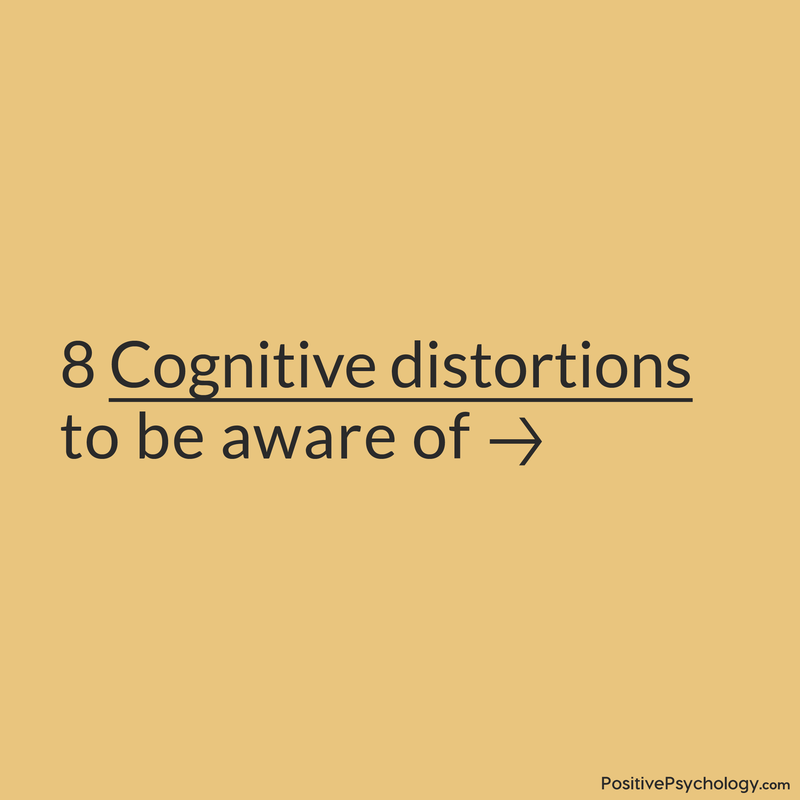
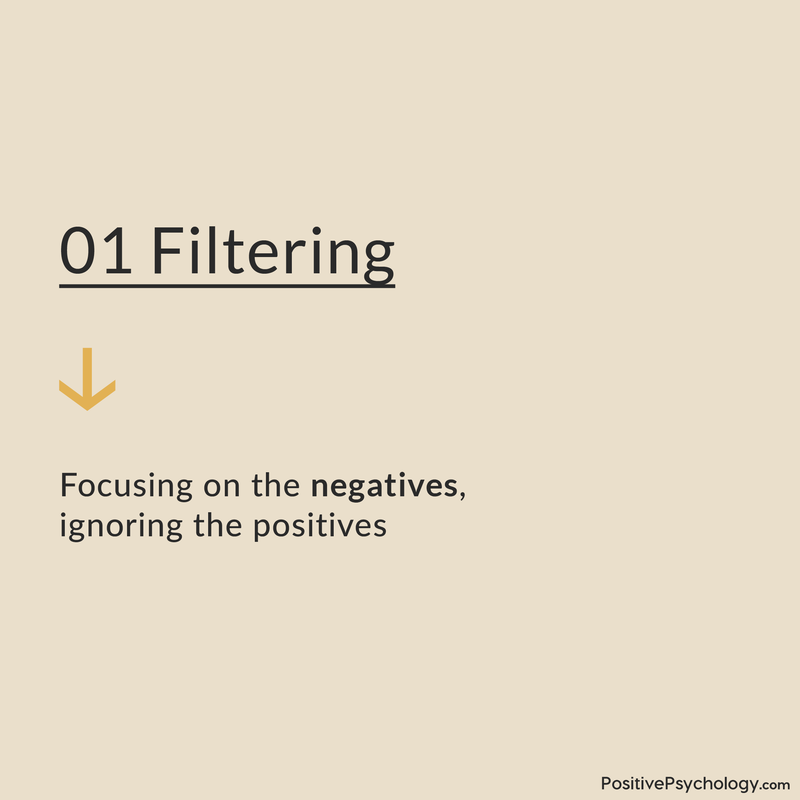
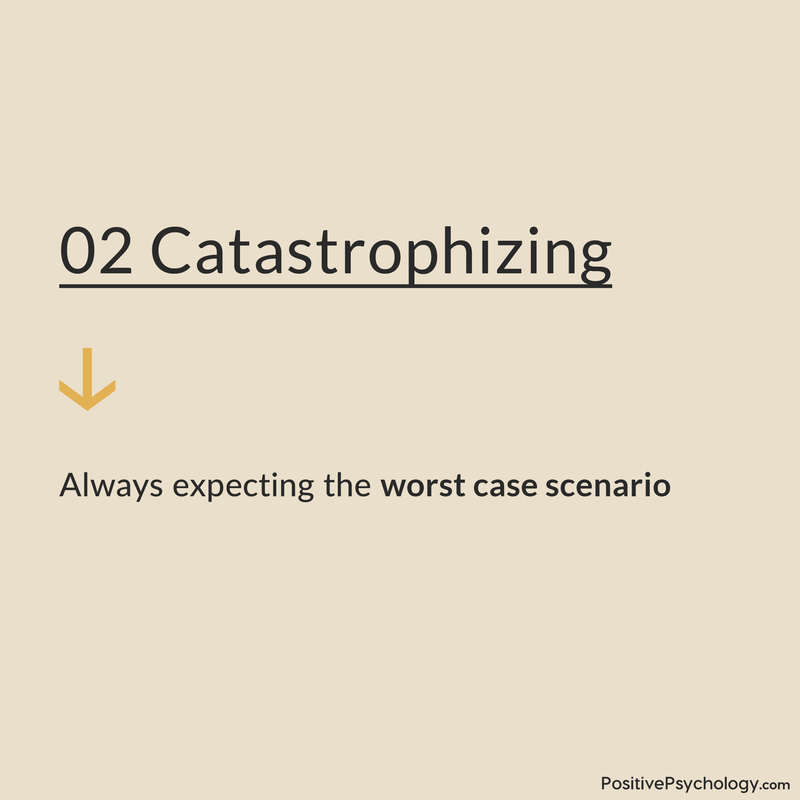
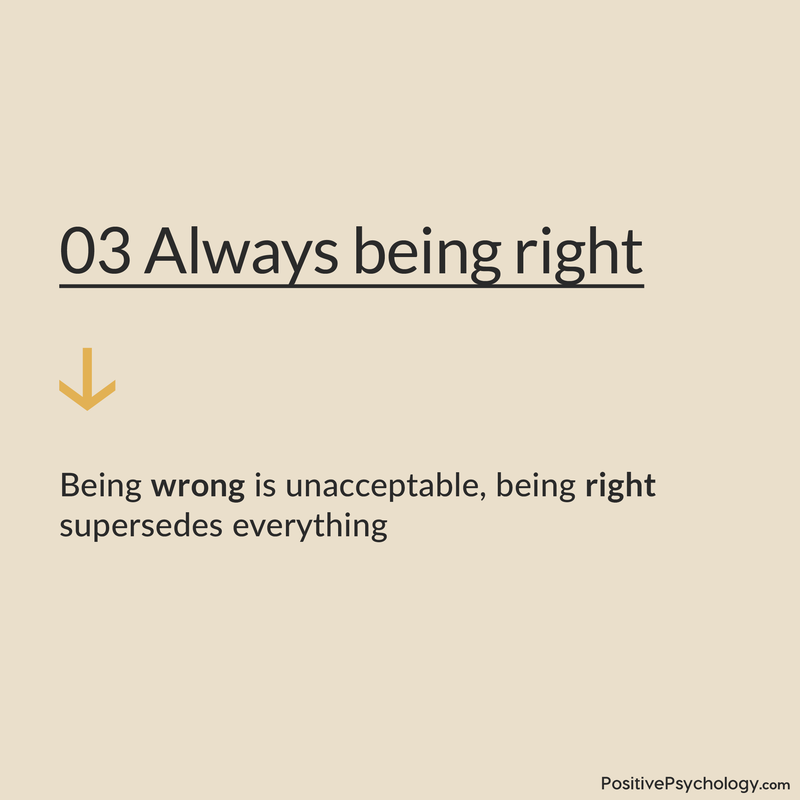
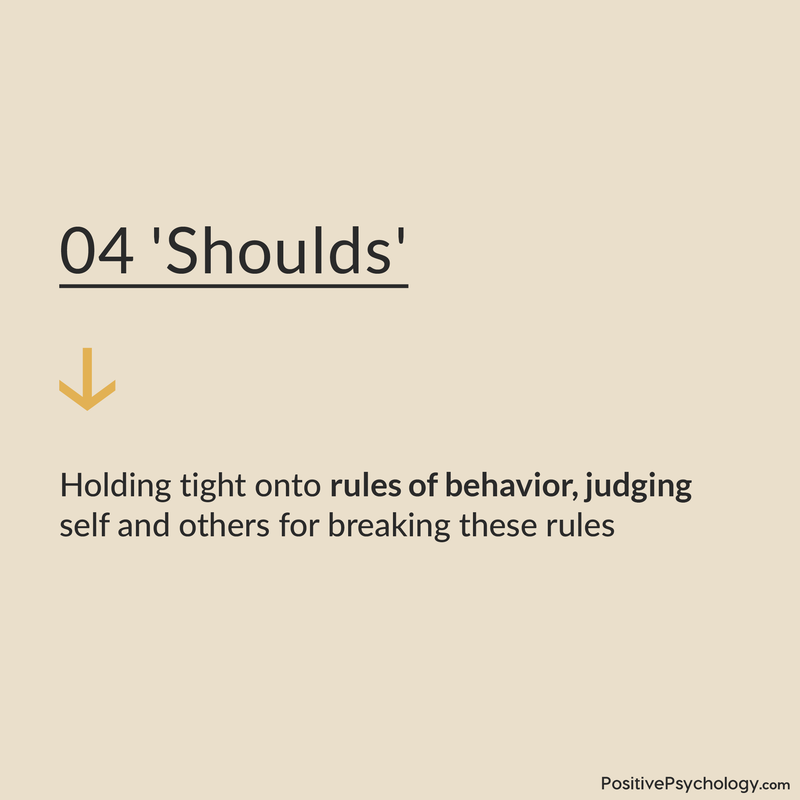
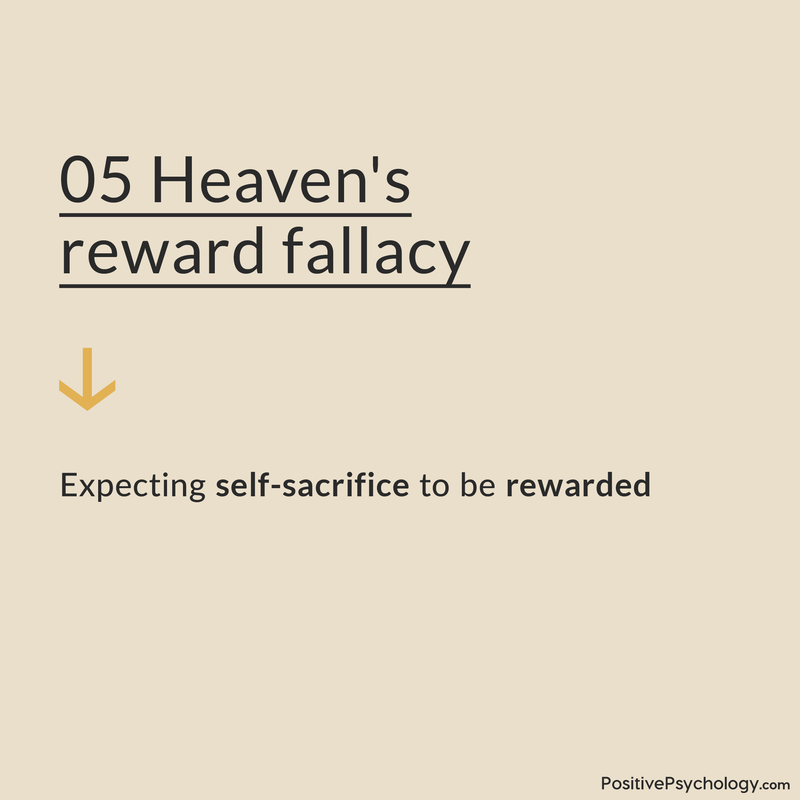
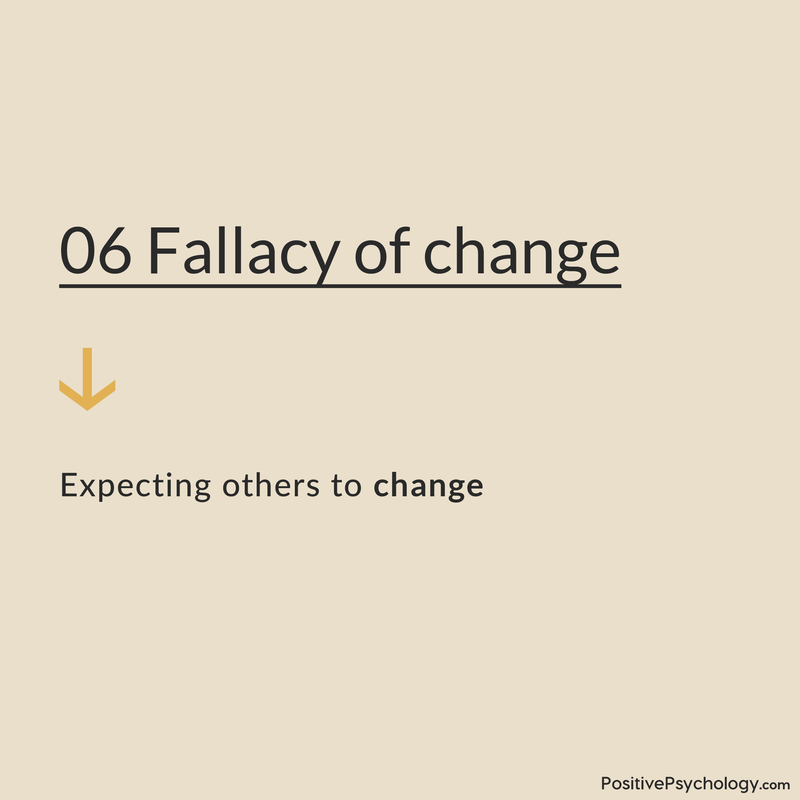
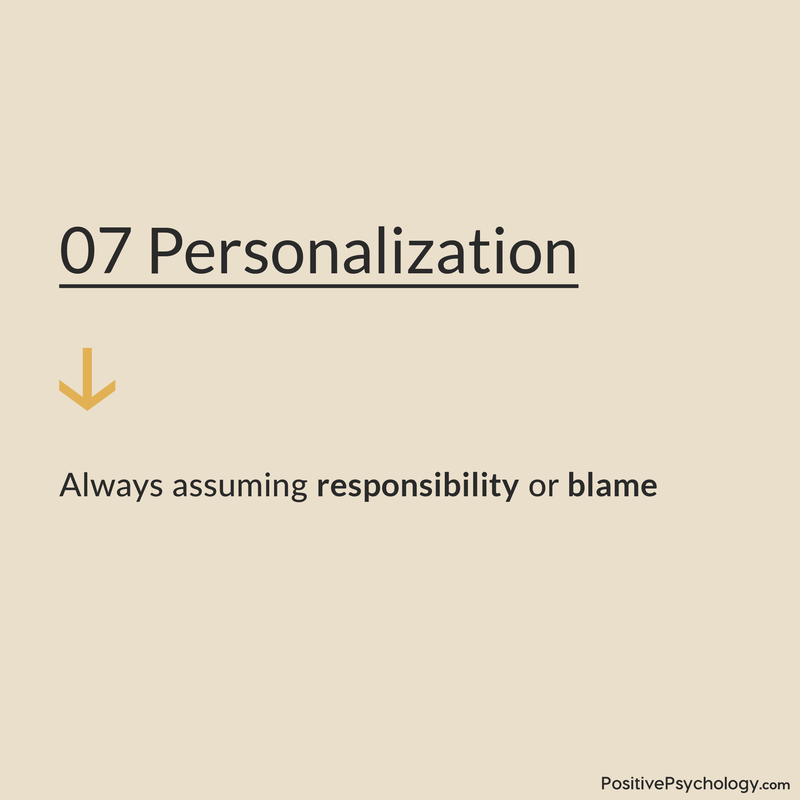
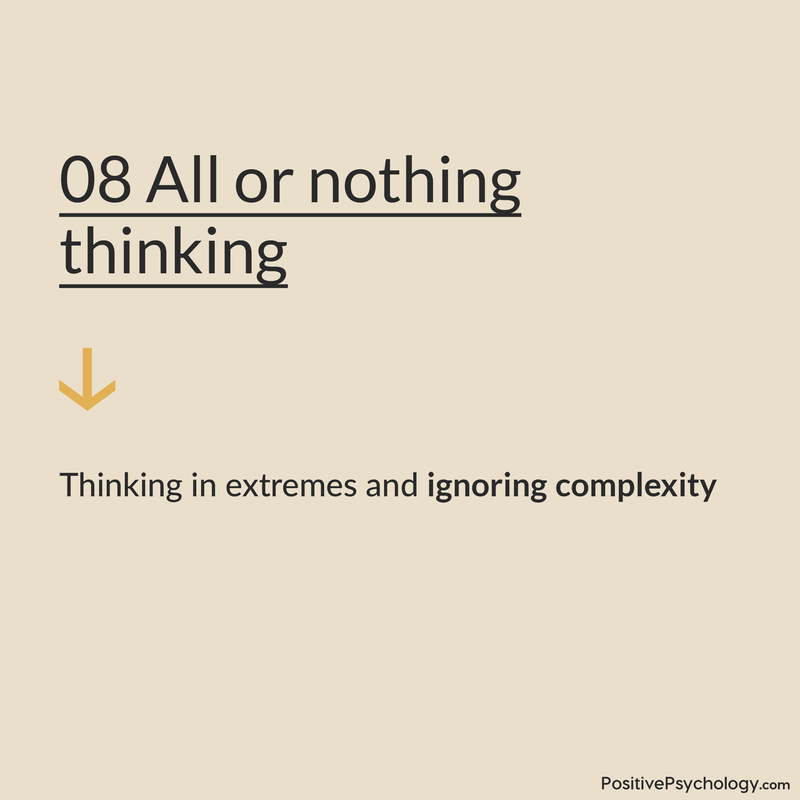
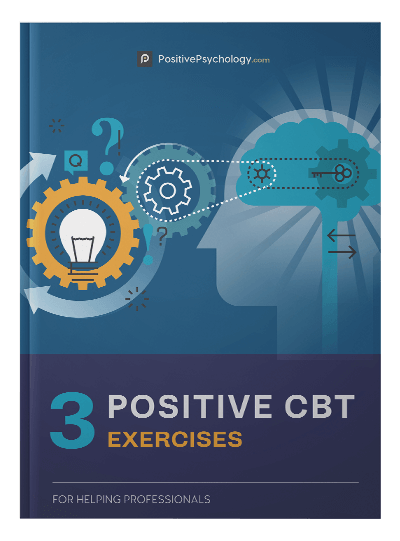
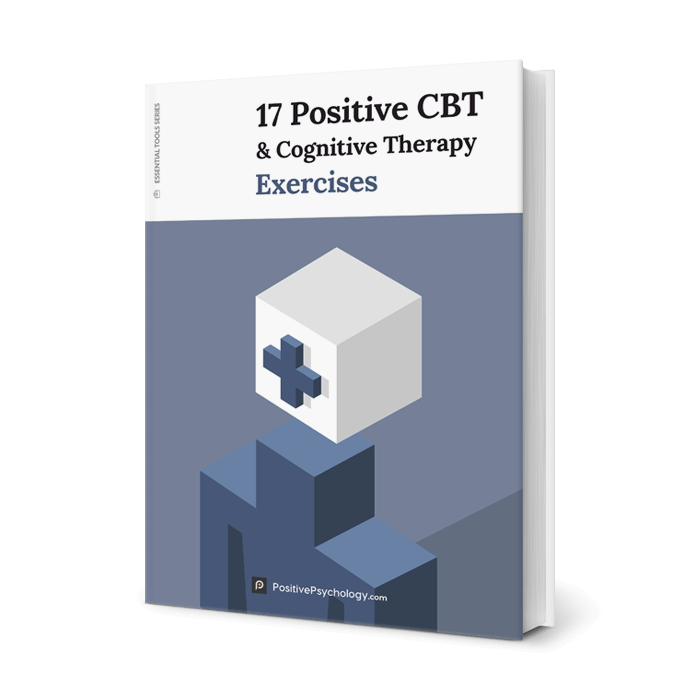




What our readers think
Wow! Very interesting! 😀 I wish you all the best <3
Hello, I enjoyed the article. my only complaint is that we should focus on grammatical correctness. Him/Her is very bad grammar we have them and they which reads as much more adult
Hi MG,
thank you for your valuable input! We are very much aware of it and have already implemented this in the newer articles, but we definitely still need to adapt the grammatical correctness in older content.
Warm regards,
Julia | Community Manager
Grammar indeed. They/them is the plural form for he/she and him/her. Without any political pseudo-scientific marxist-leninist based imperialisme of a minority. Language follows its own rules. Let it be as it always has been. As a rose is a rose. And a cow is a cow.
It’s really helpful. I’m myself struggling with anxiety and I get to know that there are so many cognitive distortions I’ve encountered with .Thank you so much .And I hope that I came out of this phase as soon as possible .
Great article, thanks for sharing these valuable information and exercises
Great article! Was a good PDF to read!
Hi,
from where I can download a questionnaire that will help to understand what is their thinking style?
Hi Wail,
Thanks for your question, I’d love to help! Could you clarify exactly which questionnaire you mean?
If you are referring to the Increasing Awareness of Cognitive Distortions exercise, you must subscribe to our PositivePsychology.com Toolkit© to gain access.
Let me know if I understood your request clearly 🙂
Kind regards,
-Caroline | Community Manager
Hi Caroline, i have a problem with catastrophizing thinking error, i do imagine and magnify some things with no reason how can i prevent that
Hi Patrick,
It’s wonderful to see your self-awareness, as recognizing the issue is the vital first step towards resolution!
We are pleased to offer you two complimentary resources designed to assist you in addressing catastrophizing thought patterns: (1) the “Challenging Catastrophic Thinking” worksheet, and (2) the “Decatastrophizing” worksheet.
We’re truly hoping these tools are helpful. Just remember, it’s one step at a time. You’ve got this!
Kind regards,
Julia | Community Manager